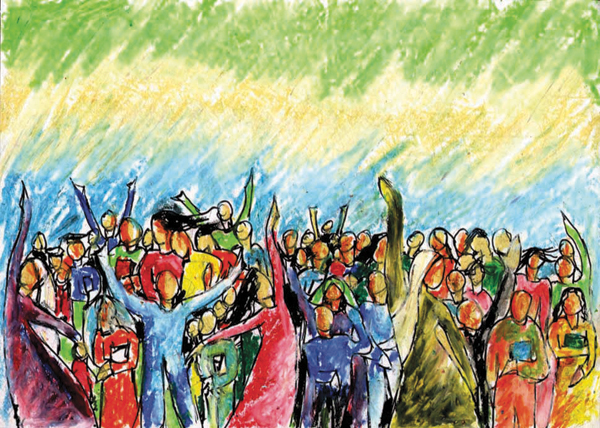
For tens of thousands of years, Homo sapiens lived in matriarchal societies. When patriarchy appeared, males began to oppress women under ideological pretexts. Only recently has humanity moved towards greater recognition of women’s rights and achievements. Women have become true and vital partners in the making of modern civilization. But despite great recent developments, patriarchy has prevailed.
In 2015, the UN member states adopted a roadmap that aims to lead to sustainable development by 2030 and outlines gender equality as one of its main goals. Here, “women’s empowerment is recognized as a vital means to help accelerate sustainable development, [deemed] a key stand-alone development goal (SDG5), and gender mainstreamed in all other goals.” Such recognition is no doubt a great objective and may serve as a motivation to unify humanity – with the exception of the blocs that still place women in a lower status than men, as if inequality were a natural rather than historical phenomenon, a custom that grew under specific circumstances and will disappear once those circumstances have been removed.
♦ Equality in power relations between men and women requires economic and political conditions that promote a culture of equality and human freedom.
So where do women stand now? In brief: Constituting 51 percent of the world’s population, only half of women are officially considered to be economically active (as opposed to over three-quarters of men); they are more likely than men to engage in domestic work without pay or benefits. Around 60 percent of countries do not ensure equal opportunities in hiring practices, equal remuneration for equal work, or even allow women to carry out the same jobs as men. The percentage of women in parliaments and local authorities is estimated to range from 10–22 percent. Women constitute 50 percent of university graduates and 22 percent of university faculty. Women are main contributors to food security: worldwide, they produce more than 50 percent of food, are responsible for the more time-consuming and labor-intensive tasks of crop and livestock production, preserve biodiversity, prepare meals, and care for the basic needs of households. The media sector is still male-dominated and promotes gender stereotypes. Organized women’s movements can be found all over the globe, with an international women’s union that cannot be overlooked or ignored by the UN or by governments worldwide; significant standards have been set through women’s advocacy. In 1977, the UN recognized March 8 as International Women’s Day and decreed it a holiday for the celebration of women’s achievements, and a Commission on the Status of Women was established under the UN Economic and Social Council in order to promote gender equality in all areas of work.
While we have success stories to celebrate, we should not be blinded from the fact that patriarchy is still predominant in culture, economy, politics, and homes – even though constitutions that stress gender equality have been adopted in many countries. Power relations are marred by inequality, and violence against women is prevalent: Some societies still maintain polygamy, the international sex trade is flourishing, and organized prostitution and female genital mutilation prevail. The UN secretary poignantly called for 2030 to be a year free from AIDS, whereas currently only 18 million out of 30 million women with AIDS receive treatment.
♦ None of the achievements in gender awareness and promotion of gender equality would have been possible without the struggles, sacrifices, and perseverance shown by women.
In the words of Phumzile Mlambo-Ngcuka, executive director of UN Women, “Women and girls are critical to finding sustainable solutions to the challenges of poverty, inequality, and the recovery of the communities hardest hit by conflicts, disasters, and displacements… Their leadership is insufficiently recognized but must emerge with greater participation in decision-making bodies… The participation of women at all levels and the strengthening of women’s movements have never been so critical, working together with boys and men, to empower nations, build stronger economies and healthier societies.”
Women’s struggles are at the forefront of the global struggle for equality and freedom, and working in solidarity with all the movements who believe in gender equality. If we combine our efforts in the coming years, we will definitely be able to reap the fruits of our labor.
» Mohammad Yacoub is deputy chief of the UNRWA Jerusalem Area Office, responsible for the Jerusalem areas in the West Bank. He is one of the founders of El-Funoun Popular Dance Troupe, the leading Palestinian traditional dabkeh group in Palestine. He is a renowned Palestinian folk singer and has played a key role in the development and advancement of the Edward Said National Conservatory of Music.
i UN Women, Women and Sustainable Development Goals – Viet Nam towards 2030, available at http://asiapacific.unwomen.org/en/digital-library/publications/2016/03/viet-nam-towards-2030#sthash.7fVBf8Ia.dpuf.
ii World Bank Group, World Development Indicators 2016, available at http://databank.worldbank.org/data/download/site-content/wdi-2016-highlights-featuring-sdgs-booklet.pdf.
iii United Nations Statistics Division, The World’s Women 2015, chapter 5: Power and Decision Making, available at http://unstats.un.org/unsd/gender/chapter5/chapter5.html.
iv World University Rankings, Proportion of female professors up, but still below a quarter, available at https://www.timeshighereducation.com/news/proportion-of-female-professors-up-but-still-below-a-quarter/2018824.article.
v Economic and Social Development Department, Gender and Food Security, II. Women’s contributions to agricultural production and food security, available at http://www.fao.org/docrep/X0198E/x0198e02.htm.
vi UN Statistics Division.
vii Kathryn Kish Sklar and Thomas Dublin, eds., Women and Social Movements International, 1840 to present, available at http://wasi.alexanderstreet.com/help/view/organization_descriptions.
viii UN Women, Message by UN Women Executive Director Phumzile Mlambo-Ngcuka on International Women’s Day, March 8, 2016, available at http://www.unwomen.org/en/news/stories/2016/3/ed-statement-iwd.


